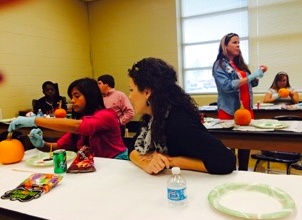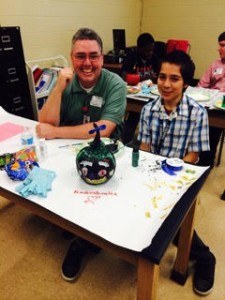Keeping students focused, on track one part of Fort Smith Public School mentoring program
by November 24, 2015 3:36 pm 892 views

Maggie Rice (right), with the Fort Smith Planning Department, works with Abbygail Diaz.
Editor’s note: story by Janette Ballman, special to Talk Business & Politics
Mentors and school officials say a mentoring program implemented by the Fort Smith Public School System is improving students’ academic performance, behavior and attendance. The program, which provides guidance to local schools, was first launched in a few locations in the district in 2012.
The program is now offered at 10 elementary and junior high schools in the district, with more interest growing on a daily basis. Mentors are largely pulled from each schools’ Partners in Education, businesses who have pledged to support the schools in whatever way necessary.
There are 220 businesses in the Partners in Education program and 285 mentors in the Fort Smith school district, each providing one-on-one guidance to a student. According to Zena Featherston Marshall, the district’s director of communications and community partnerships, each school designs their own mentoring program, sets their schedule and pairs students with mentors. The district offers training, resources and guidance.
She lists Chaffin Junior High, Darby Junior High, Kimmons Junior HIgh, Ramsey Junior High, Spradling Elementary, Howard Elementary, Cook Elementary, Orr Elementary, Ballman Elementary and Sunnymede Elementary as participating schools.
“We believe building an awareness of the value of mentoring is a critical component of what the district should accomplish,” Marshall said.
NATIONWIDE SUCCESS
Nationwide, mentoring programs have received high marks for improving the academic, emotions and behaviors of students. A 2014 survey published by The National Mentoring Partnership reports that young people who have mentors are more likely to improve academic performance, 52% more likely to attend school regularly and 20% more likely to graduate high school and attend college.
In addition, youth.gov reports that a supportive relationship between mentors and mentees produces both immediate and long-term contributions. Benefits include reduced high school dropout rates, better lifestyle choices, enhanced self-esteem and self-confidence and improved behavior. The most successful mentoring programs incorporate practices that include targeting youth most likely to benefit from mentoring, using rigorous approaches to train and screen mentors, have clear goals and provide ongoing support for the mentors.
The Fort Smith Public Schools mentoring program meets all of these practices, said Marshall. Training for mentors is provided yearly and includes instruction on boundaries, accountability, and safety. All mentors submit to background checks using the Raptor Volunteer Management system. The district is looking at upgrading their screening software to provide more safety for students and mentors in the program.

Students are recommended for mentoring programs for a variety of reasons, not just academics or behavior. This ensures that high-risk needs of all types are met.
“Mentoring is not just about discipline issues,” said Marshall. “Sometimes the student may just need a mentor to be present, help develop plans for the future and advise the student on what they need to do to achieve those goals. Other kids just lack confidence or have self-esteem issues.”
Todd Marshell, principal at Chaffin Junior High, said his school offers a boys’ mentoring program, Edge, and a girls’ program, Gems. Twenty students participate in each program.
“We have a big mix,” said Chaffin counselor Katie Mankins. “Students accepted into the program can have behavioral, academic or social issues or it can also involve family problems or low-self esteem.”
At Darby Junior High, Ashley Gerhardson, instructional facilitator-literacy, said the school’s mentoring program has 12 students in their program. Students meet with mentors one or two times a month, depending on the school schedule.
“Having a mentor makes the student more accountable and holds them to a higher standard. Mentors serve as a role model and a link to the community,” said Gerhardson.
National statistics reported in the Mentor survey show 51% of students involved in the mentoring program for one year report it to be “very helpful.” When a student remains for more than one year, that statistic jumps to 67%.
‘NO MAGIC PILL’
Kyle Kincheloe, a ninth grade student at Darby who has been in the program for three years, said mentoring has made a huge difference in his life.
“It helps me to become a better person. In seventh grade, I got in a lot of fights and was suspended many times,” he said. “I don’t do that anymore. Even my own mom doesn’t believe it’s me.”
He credits his mentor with keeping an eye on him and holding him accountable.
“It is a really good program to find. You form the relationship with the mentor and they help you push through the obstacles that are stopping you from achieving success,” said Kincheloe.
Tim Bailey, president of Candy Craze, has served as a mentor at Chaffin since the program was implemented. He calls the Chaffin program ‘a good model’, since the students and mentors meet together in the library with school staff supervision. This provides accountability for both the mentors and the participants, as well as ensures that the mentoring program stays on track.
Bailey’s first mentee, Alex Smith, is now a senior at Southside High School. He credits the program with helping him to work through anger issues and set goals that have led him to be a successful student. Smith worked with Bailey during his 8th and 9th grade years, and still remains in contact.
“At that age, there is a lot of awkward stuff that you don’t want to discuss with parents. Having a mentor helped me cope with many issues including my temper, which had led me to many fights in my earlier years,” he said.
Smith is now on track to graduate high school with a B average, holds a welding certificate and is concurrently attending college classes plus working a part time job.
“My mentor helped nudge me to keep on track. They don’t force you to do anything. Sometimes we’d talk about the deep issues and other times we would just talk about anything. Without Mr. Bailey and the program, I don’t think I’d be in the place I am now.”
Bailey said the mentoring program is “no magic pill’ and everything can’t be fixed by talking with the student. But, having that commitment and sticking with it makes a huge difference for students who need that extra support.
MEASURING THE PROGRAM
Statistics from the 2013/2014 school year at Chaffin Junior High show students involved in the Edge program improved their attendance by 50% for excused absences and 90% for unexcused absences. Benchmark test scores in math were raised from basic to proficient and out of school suspensions decreased from 13 days to zero. Literacy scores increased to proficient and the amount of passing grades increased by 50%.
Katie Kreimer, assistant principal at Chaffin, said in the 2014/2015 school year, statistics will be gathered on a quarterly and year-end basis. Data compiled includes test scores, grades, office referrals and attendance. Marshall said district-wide tracking is in the works, but the program is still young compared to many national organizations. While tracking academic and attendance data can be helpful, Marshell and Bailey say the true wealth of the program is seeing confidence increase in students and seeing self-worth grow.
“A lot of success through the mentoring program is perceptual. There is no data to back up how self-worth has improved or happiness is elevated. We gauge that by visual observation and communication with the student,” Marshell said.
Bailey agrees, adding “It’s easy to assess the measurable data – grades, attendance, behavior reports – but it is more meaningful for me to see the kids connect with mentors. To find things that are hindering them and holding them back from achieving success is very rewarding.”
ALSO REWARDING FOR THE MENTOR
Anne Dunn, a long-time mentor in the Fort Smith school district and senior vice president at First National Bank of Fort Smith, volunteers at Ballman Elementary one time a week to mentor a sixth grade student.
“It is really rewarding to have a student reassure you that they want to see you on the next visit. You get that on your calendar and you make sure that you are there,” she said.
Dunn has recruited dozens of co-workers, including the bank president, into the mentoring program.
“It is as beneficial to the mentor as it is to the mentee. It is huge to know that you’ve got these young kids out there that are trying to feel their way through life and they have someone outside of home that is interested in their success.”
While mentoring brings success to students, it is not designed to imply that students have no other support in their home or school life.
The “Mentor: The National Mentoring Partnership” survey reports that inadequate parenting or school support are not usually the reasons a student needs a mentor. Rather, research suggests one of the biggest roles mentors play is to encourage better parent-youth and teacher-student relationships.
“As a mentor, I’m another avenue of support,” said Bailey. “I’m thankful to be able to add support for the student and work along side parents, teachers, coaches, pastors and all the other influences these kids have in their lives.”
STAYING FOCUSED ON GOALS
Aaliyah Huff, a ninth grade student at Darby, summed up her relationship with her mentor in just three words.
“I love her,” she said with a huge smile.
Huff was bullied in a previous school and found the mentoring program what she needed to boost self esteem and learn coping skills.
Other students at Chaffin, Josh Perkins and Robert Harrison, said their mentors have helped improve their study skills and academic grades. Perkins also said the positive reinforcement was rewarding.
“Too many times, you only hear the negative,” he said. “We’re called out all the time for what we do wrong. But in this program, you are praised for the good efforts you make. It’s a welcome change.”
C.J. Spicer, a ninth grade student, said since he’s been in the program his grades are better and he has learned to focus to stay on track. Before beginning the program, Spicer attended summer school to pass seventh grade. His mentor, James McMillan of Brown Hiller Clark, said Spicer has made great strides in setting goals and working toward graduation and ultimately, welding school.
“There will always be things in life that get in the way,” said Spicer. “I’m learning how to navigate around those issues and not let them distract me from my goals.”
